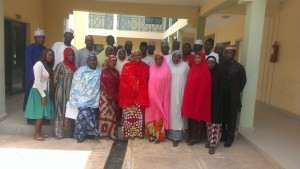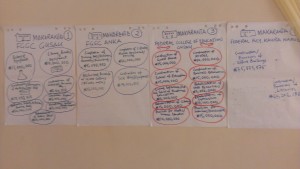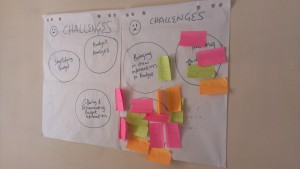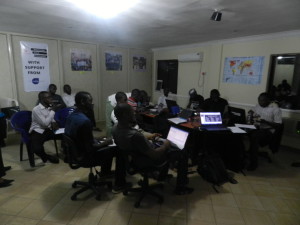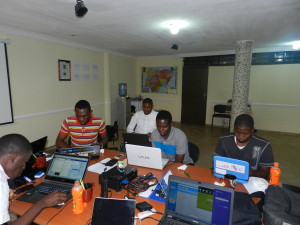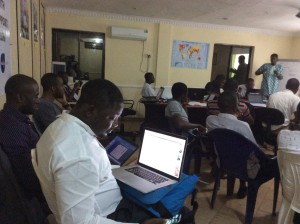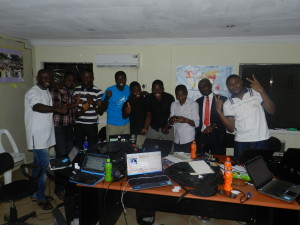The Diary of Oluwasomidotun
Friday, October 24, 2014
Monday, September 29, 2014
[MY POST ON @SchoolofData BLOG]: BREAKING THE KNOWLEDGE BARRIER: THE #OpenData PARTY IN NORTHERN NIGERIA
If the only news you have been watching or listening to about Northern Nigeria is of the Boko Haram violence in that region of Nigeria, then you need to know that other news exist, like the non-government organizations and media, that are interested in using the state and federal government budget data in monitoring service delivery, and making sure funds promised by government reach the community it was meant for.
This time around, the #OpenData party moved from the Nigeria Capital – Abuja to Gusau, Zamfara and was held at the Zamfara Zakat and Endowment Board Hall between Thursday, 25 and Friday, 26, 2014. With 40 participant all set for this budget data expedition, participants included the state Budget Monitoring Group (A coalition of NGOs in Zamfara) coordinated by the DFID (Development for International Development) State Accountability and Voice Initiative (SAVI),other international NGOs such as Society for Family Health (SFH), Save the Children, amongst others.
But how do you teach data and its use in a less-technology savvy region? We had to de-mystify teaching data to this community, by engaging in traditional visualization and scraping – which means the use of paper artworks in visualizing the data we already made available on the Education Budget Tracker. “I never believed we could visualize the education budget data of the federal government as easy as what was on the wall” exclaimed Ahmed Ibrahim of SAVI
As budgets have become a holy grail especially with state government in Nigeria, of most importance to the participants on the first day, was how to find budget data, and processes involved in tracking if services were really delivered, as promised in the budget. Finding the budget data of the state has been a little bit hectic, but with much advocacy, the government has been able to release dataset on the education and health sector. So what have been the challenges of the NGOs in tracking or using this data, as they have been engaged in budget tracking for a while now?
“Well, it is important to note that getting the government to release the data took us some time and rigorous advocacy, added to the fact that we ourselves needed training on analysis, and telling stories out of the budget data” explained Joels Terks Abaver of the Christian Association of Non Indigenes. During one of the break out session, access to budget information and training on how to use this budget data became a prominent challenge in the resolution of the several groups.
The second day took participants through the data pipelines, while running an expedition on the available education and health sector budget data that was presented on the first day. Alas! We found out a big challenge on this budget data – it was not location specific! How does one track a budget data that does not answer the question of where? When involved in budget tracking, it is important to have a description data that states where exactly the funds will go. An example is Construction of Borehole water pump in Kaura Namoda LGA Primary School, or we include the budget of Kaura Namoda LGA Primary School as a subtitle in the budget document.
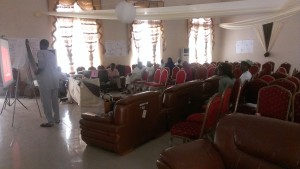
Taking participants through the data pipelines and how it relates to the Monitoring and Evaluation System
In communities like this, it is important to note that soft skills are needed to be taught – , like having 80% of the participants not knowing why excel spreadsheets are been used for budget data; like 70% of participants not knowing there is a Google spreadsheet that works like Microsoft Excel; like all participants not even knowing where to get the Nigeria Budget data and not knowing what Open Data means. Well moving through the school of data through the Open Data Party in this part of the world, as changed that notion.”It was an interesting and educative 2-day event taking us through the budget cycle and how budget data relates to tracking” Babangida Ummar, the Chairman of the Budget Working Group said.
Going forward, this group of NGO and journalist has decided to join trusted sources that will be monitoring service delivery of four education institutions in the state, using the Education Budget Tracker. It was an exciting 2-day as we now hope to have a monthly engagement with this working group, as a renewed effort in ensuring service delivery in the education sector. Wondering where the next data party will happen? We are going to the South – South of Nigeria in the month of October – Calabar to be precise, and on the last day of the month, we will be rocking Abuja!
- See more at: http://schoolofdata.org/2014/10/01/breaking-the-knowledge-barrier-the-opendata-party-in-northern-nigeria/#sthash.sbEvoBaa.dpuf
Friday, August 29, 2014
[MY POST ON @SchoolofData BLOG]: A WEEKEND OF DATA, HACKS AND MAPS IN NIGERIA
It was another weekend of hacking for good all around the world, and Abuja, Nigeria was not left out of the weekend of good, as 30 participants gathered at the Indigo Trust funded space of Connected Development [CODE] on 12 – 14 September, scraping datasets, brainstorming creating technology for good, and not leaving one thing out – talking soccer (because it was a weekend, and Nigeria “techies” love soccer especially the English premiership).
Leading the team, was Dimgba Kalu (Software Architect with Integrated Business Network and founder TechNigeria), who kick started the 3 day event that was built around 12 coders with other 18 participants that worked on the Climate Change adaptation stream of this year #Hack4Good. So what data did we explore and what was hacked over the weekend in Nigeria? Three streams were worked :
- Creating a satellite imagery tagging/tasking system that can help the National Space Research Development Agency deploy micromappers to tag satellite imageries from the NigeriaSat1 and NigeriaSat2
- Creating an i-reporting system that allows citizen reporting during disasters to Nigeria Emergency Management Agency
- Creating an application that allows citizens know the next water point and its quality within their community and using the newly released dataset from the Nigeria Millennium Development Goal Information System on water points in the country.
Looking at the three systems that was proposed to be developed by the 12 coders, one thing stands out, that in Nigeria application developers still find it difficult to produce apps that can engage citizens – a particular reason being that Nigerians communicate easily through the radio, followed by SMS as it was confirmed while I did a survey during the data exploration session.
Going forward, all participants agreed that incorporating the above medium (Radio and SMS) and making games out of these application could arouse the interest of users in Nigeria. “It doesn’t mean that Nigerian users are not interested in mobile apps, what we as developers need is to make our apps more interesting” confirmed Jeremiah Ageni, a participant.
The three days event started with the cleaning of the water points data, while going through the data pipelines, allowing the participants to understand how these pipelines relates to mapping and hacking. While the 12 hackers were drawn into groups, the second day saw thorough hacking – into datasets and maps! Some hours into the second day, it became clear that the first task wouldn’t be achievable; so much energy should be channelled towards the second and third task.
Hacking could be fun at times, when some other side attractions and talks come up – Manchester United winning big (there was a coder, that was checking every minutes and announcing scores) , old laptops breaking (seems coders in Abuja have old ones), coffee and tea running out (seems we ran out of coffee, like it was a sprint), failing operating systems (interestingly, no coders in the house had a Mac operating system), fear of power outage (all thanks to the power authority – we had 70 hours of uninterrupted power supply) , and no encouragement from the opposite sex (there was only two ladies that strolled into the hack space).
As the weekend drew to a close, coders were finalizing and preparing to show their great works. A demo and prototype of streams 2 and 3 were produced. The first team (working on stream 2), that won the hackathon developed EMERGY, an application that allows citizens to send geo-referenced reports disasters such as floods, oil spills, deforestation to the National Emergency Management Agency of Nigeria, and also create a situation awareness on disaster tagged/prone communities, while the second team, working on stream 3, developed KNOW YOUR WATER POINT an application that gives a geo-referenced position of water points in the country. It allows communities; emergency managers and international aid organizations know the next community where there is a water source, the type, and the condition of the water source.
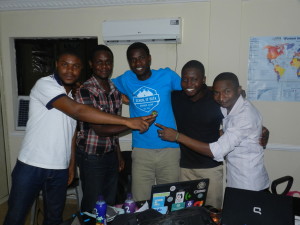
(The winning team of the Hack4Good Nigeria) From Left -Ben; Manga; SchoolofData Fellow -Oludotun Babayemi; Habib; Chief Executive, CODE – Hamzat
Living with coders all through the weekend, was mind blowing, and these results and outputs would not be scaled without its challenges. “Bringing our EMERGY application live as an application that cuts across several platforms such as java that allows it to work on feature phones can be time consuming and needs financial and ideology support” said Manga, leader of the first team. Perhaps, if you want to code, do endeavour to code for good!
- See more at: http://schoolofdata.org/2014/09/16/a-weekend-of-data-hacks-and-maps-in-nigeria/#sthash.PaJxPeOU.dpuf
Wednesday, April 9, 2014
[FOR THE PRESS] 2014 CELEBRATES THE BIGGEST EARTH HOUR CELEBRATION IN NIGERIA AND IN HISTORY
The entire world witnessed the Earth Hour
phenomenon sweep across the planet in its eighth year, as WWF’s Earth Hour 2014
broke all records of mass participation mobilizing hundreds of millions of
people to become everyday Super Heroes for the planet.
Earth Hour
proved the movement is now stronger than ever, with the event observed in over
162 countries including Nigeria and territories and over 7000 cities and towns,
creating magical lights off moments in every continent of the world. The
symbolic hour has grown into the world’s largest grassroots movement for the
environment, with beyond the hour activities and initiatives happening
throughout the year.
In Nigeria, Earth Hour organised by
Connected Development [CODE] was observed in 5 cities – Abuja at the Transcorp
Hilton; Lagos at the “Earth Hour Garden” opposite the Lagos State House of
Assembly; Taraba at the Kwararafa University in Wukari; Portharcourt at the
LeMeridien Ogeyi Place and in Benin City at the Youth House.
“It’s always extraordinary to see cities
and landmarks involved in the ‘lights off’ event, but the most exciting thing
about Earth Hour this year is seeing the amount of projects and campaigns that
are taking action beyond the hour. From crowdfunding to campaigns that are
creating environmental awareness across the West Africa region, Earth Hour is
harnessing the power of the crowd far beyond the hour,” said Oludotun Babayemi,
Country Director for Earth Hour in Nigeria.
Last year alone saw thousands of Nigerians
petitioned the president to pass the climate change bill into law to create a
climate change commission to superintend over climate change activities in
Nigeria. In 2014, the bill has been reintroduced and passed to the Senate for
harmonisation. Likewise, the Walk to Mali campaign has started inspiring
different communities across the West Africa region with the Kwararafa
University pledging a 20km reserved forest for the flora and fauna.
WWF-Uganda began the fight against the
6,000 hectares of deforestation that occurs in the country every month by
creating the first “Earth Hour Forest.” In 2012, Russians also petitioned to
get legislative change protecting the country’s seas from oil pollution and now
are striving to protect an area of forest twice the size of France.
These Earth Hour success stories illustrate
the movement has become a global collaboration to show what can be achieved for
the planet.
In
Nigeria, the Earth Hour celebration 2014 began its journey in Wukari, Taraba
where community events were held all over the community and at Kwararafa
University. Moving across to Wukari town where hundreds of community members
joined the team and held a community sensitisation and advocacy on
environmental sustainability hosted by the Taraba state coordinator, Anthony
Agbor. The event within the community was grazed by the Boys Brigade Base Band
and the Skaters Club of Wukari
The hour of inspiration then went back to
its humble beginnings, as Earth Hour once again hit Abuja bringing to light the
plight of one of the memorable hotels in the country with an environmental
friendly atmosphere – The Transcorp Hilton. The Light out event anchored by Big
Mo of Wazobia FM in Abuja, kicked off with the greetings to Nigeria cities
taking part in Earth Hour, delivered by the FCT coordinator for Earth Hour,
Oladotun Fadeyiye, while TED style keynote speech was given by Baaki John of
the Women Environmental Programme (WEP) on environmental sustainability and
women.
To drive action and support, a new
exhibition waiting to be premiered as a movie “Walk to Mali” was screened
during the hour, and the campaign also engaged people around the world to use
their power and add their voice to protect vulnerable communities. "To witness
Earth Hour in Abuja for the third year in a row, the event makes a powerful
impression on me," said Hamzat Lawal, the Chief Executive of CODE.
"To see people united in a single purpose of making our lifestyles less
impactful on the planet inspires me immensely.”
Continuing to the second home of Earth
Hour, Lagos celebrated the event by empowering young school children with the
message that people are the true everyday Super Heroes for the planet. Using
none other than Spider-Man to join the global flagship event, the young stars
from the Vicsum Private School were educated on the value of efficient energy
use. “How to Take Action” speeches were delivered by Olumide Idowu; Halima Baba
- Lagos State coordinator for Earth Hour
and Babatunde Shodiyan from the department of Conservation and Ecology of the
Lagos state ministry of Environment.
“We hope the power of Spider-Man joining in
the largest movement for the planet – Earth Hour will inspire this future
generation in becoming super heroes for their various communities on
environmental sustainability” Halima Baba said.
Right now, Earth Hour is moving across the
globe, following the setting sun, sending billions of people around the world a
message that each of us has the power to make a difference. Each of us can be a
Super Hero for the planet," Reiterated Baba said.
In Portharcourt, the lights off event then
went to the Le Meridien Ogeyi Place at GRA. Hosted by Gift Godden, the city
coordinator for the event, Earth Hour drew attention to the “Black Gold,” and
the need to reduce air pollution and Oil Spills. The participants were
encouraged to collaborate on ideas in order to inspire change towards healthier
air and communities.
“It is pertinent to include every
stakeholder in the build up to this popular environmental movement, it will
help us in achieving our advocacy campaigns towards an oil spill free
environment” said Okoduwa Sylvester of the Ofure Center for Peace and
Development.
The management of the Le Meridien Ogeyi
place was quite excited to be part of this movement again, having won a
sustainability award for taking part during Earth Hour in 2013. “This movement
will forever live in our memory, as it inspires institutions like ours to join
in and do more to save our planet earth. Next year again, we will be part of
this movement” said Henry Orie, the Food and Beverage Manager at Le Meridien.
In tandem with the crowd’s enthusiasm at
events across the world has been Earth Hour’s massive digital presence,
including the recently launched Earth Hour Blue to drive digital engagement
beyond the hour. The revolutionary platform for the planet allows anyone in any
country to use their voice or their dollar to take action and support projects
of their choice across the globe, and further encourages participants to use
their favourite social platforms to engage in their favourite crowdfunding and
crowdsourcing projects.
As a newcomer to the crowdfunding scene,
Earth Hour Blue has launched with WWF projects from Australia, Indonesia,
Singapore, China, Nepal, India, Russia, Uganda, South Africa, Madagascar,
Canada and Columbia which are now all live on the crowdfunding platform powered
by Crowdonomic.
Thursday, March 27, 2014
THE OPEN DATA DAY IN ABUJA: LIBERATING SERVICE DELIVERY IN THE EDUCATION SECTOR IN NIGERIA
As building capacity of government officials, CSOs and
journalist remains important in the data liberation evangelism, the Follow The Money team focused more on their data
expedition class on Open Data Day held at CODE with 28 participants. They
include government officials from Nigeria Extractive Industries Transparency Initiative
[NEITI], National Space Research and Development Agency [NASRDA], and the FCT Mass
Education Board, participants from the private sector, the media and CSOs. With
Oludotun Babayemi, a data enthusiast taking the participant through basics of
data design, data cleaning and publishing data, participants were thrilled having
insights on how to use data to tell stories “I have been bundle with so much
information today, and I appreciate this session, I now know where to get data
from and how to use spreadsheet for collaboration” explained an excited
Chinyere Opia from HOT FM
Demonstrating
the practical session at the Education Hackathon was quite strategic to use in
complimenting the practical sessions that went into training participants on
sorting, filtering and cleaning data. The Hackathon allowed participants to
filter and sort Nigeria data on Education within datasets downloaded from the
World Bank project sites, and also update mapping of funds from the budget
office on capital expenditures meant for federal education institutions in
Nigeria. [LOOK] how one of the participant
described #ODDAbuja
In
Nigeria, billions of Naira has been spent [through government spending and
international aid] on infrastructures on education that, often wouldn't reach
the community [Please read achieving the MDG goals in Nigeria] that it was
meant for. "Infact we have many challenges, One I will like to say is
government providing books and infrastructures that will make the children to
learn, and also levies on children which at times they might not be able to
afford" says Blessing Hassana [Watch the video], Principal of a secondary school in Nasarawa state
[that's a state just 20km away from the capital city, Abuja], what will happen
in other states? Perhaps, this says much about why there are still about 10
million out of school children in Nigeria.
With
the Education Budget Tracker still being curated for
government spending and international aid, the strategy is to focus on how many
education projects are operational in these communities. This Education Budget
Tracker which allows for education point mapping has huge potential as an
effective monitoring and management tool for planning and decision making. It
can really help government and funding agencies to know where to focus more on.
Some places might need infrastructure, while some its maintenance and others
might be training.
In
this way, the Ministry of Education and other donor agencies will be able to
monitor the impact of its large investments in the education sector. It will
also allow transparent tariff settings that reward good performance and
highlight inefficiencies. Moreover, it is interesting to know that this tool
allows trusted local people to provide information about the education service
delivery in their communities using their mobile phones. “Going forward for us,
the Follow the Money team is seeking partnership with interested entities to
pilot the usage of this tool in one of the states with poor education
performance index in northern Nigeria” says Hamzat Lawal while demonstrating
how we intend to use the tool to participants.
The
Open Data Day evening session started with a brief introduction of the Digital Humanitarian Network and how its members have
been using technologies before, during and after emergencies. How CODE intends to engage organizations and
communities interested in emergency response across the West African region
using technology was highlighted and some government participants were quite
interested and keen in how CODE will integrate crisis mapping into their
situation awareness room. “It is quite interesting to know that CODE is leading
innovative ideas in the region to help in early warning and emergency response,
it will be great to showcase this to the National Emergency Management Agency
[NEMA]” advised Godstime James of the National Agency for Space Research and
Development.
Friday, March 7, 2014
WATER ACCESSIBILITY AND ITS QUALITY IN NIGERIA
Sitting at the second technical committee
meeting on the review of Nigerian
standard for drinking water quality(NSDQW) NIS 554: 2007 organized by
Federal Ministry of Water Resources in
collaboration with the Standard Organization of Nigeria [SON] , the World
Health Organization, UNICEF and other stakeholders in the water sector, I
remembered Tunga Guru, a community in Zamfara state which had only a pond to
take water from."This is our only source of water, and we have not seen
anyone interested in giving us a hand pump like the other communities"
exclaimed Ahmad Almakura, a Tunga Guru Community member.
As Tunga Guru isn't the only community
deprived of safe water, the memories of our community outreach to Gutsura
dawned on me. "As we have given up on expecting the government to errect
building on the new site they said we should relocate to, we have decided to
move ourselves, but I have dug three wells at the new site, but couldn't find
water" lamented Muhammed Tukur.
So far, Nigeria is way off-track in meeting
its Millennium Development Goal (MDG) targets of 75% coverage for safe drinking
water and 63% coverage for basic sanitation by 2015. This is even more
worrisome if one considers that access to safe, clean water is a cross cutting
issue which affects all other sectors such as health and education with wider
impacts on the economy.
In Nigeria, approximately 66 million
Nigerians still do not have access to safe water (i.e. 44% of the population).
Only 47% in
rural areas do have access while 75% in urban
centers do have access. Performance on sanitation is even worse. The
sanitation coverage stands at 31% representing a reversal from 37% coverage in
1990.
As poor coordination of the activities of
the various agencies working in the WASH sector also has proved to be a big
setback in the delivery of effective services in the sector. This is because
inadequate clarity on the roles and responsibilities of the different actors in
the sector makes it difficult to maintain coherence and avoid duplication of
efforts and resources, which is crucial for effective and efficient use of the
limited resources available and for increased productivity. the committee
meeting, was mostly dedicated to getting MDAs to know their exact roles in
terms of WASH activities in the country, and modeling. It was agreed that to
avoid contamination a minimum of 10m and maximum of 30m should be the distance
between water sources and septic tanks. All parameters and maximum permitted
limits for drinking water quality remain the same.
The most interesting part of the document
was on data management which is on 6.4 on the living
document. It stated that Water quality result shall be accessible to the
general public; in essence water quality should be made open. But how open and
available is water points and their quality in Nigeria? Having knowledge of
water points and its quality will allow policy makers to donor agencies to make
better decisions especially on where or what community needs water. A good place to start is the new databank of the country's MDG Office
With the Federal
Ministry of Water Resources data bank
still pending and "closed" it will be pertinent for
stakeholders to keep advocating for its implementation. "I believe we have
all seen and made adequate comments on the document so that this meeting will
serve as a means to harmonize these comments in order to finalize the process and
come up with a standard document that is enforceable with all stakeholders
owing it and performing their responsibilities effectively" said Mr S. O.
Ome, the Director Water quality control and sanitation.
Friday, February 7, 2014
KETA VILLAGE, BURIED IN THE GORONYO DAM BY FLOODING
“Our town is chiefly known for the production of dry crops
such as Guinea Corn, Onion, Rice, tomatoe and pepper, and I will like to add
that we can produce as much rice that can feed the whole Nigeria” said Alhaji
Mohammed Sambo Usman [Sarkin Gabas of Goronyo]
as he welcomed us to his palace after a 100 km hitchhike from the Sokoto
Metropolis on January 22, 2014.
Alhaji Mohammed affirmed that some villages within the town have
been witnessing several flooding in the past years, always caused by the rise
in water level of the Goronyo Dam. Villages that are mostly affected include
Keta Village and Taloka Village, all about 20km from the Goronyo town where the
palace is situated. Unlike Gutsura in Zamfara state, Taloka has been permanently
and completely relocated to a new government – built facility for communities
displaced by floods.
Consequently, the team decided to work at Keta Village, situated just behind the Goronyo
Dam. We sited a new health centre, as we proceeded to the village head
compound. Alhaji Garbi Jingi explained how they have been coping with incessant
flooding for 5 years. “We need the urgent construction of an elaborate
embankment that will protect the village from loss of their crops and farming
activities to flooding.
 |
| Mobile Geo-tagging of flood plains within Keta Village |
 |
| Conducting a group discussion with key community members |
 |
| During the participatory mapping |
“We always lose millions of our farming produce to flooding
during the last 3 years, and 3 people have lost their lives (2 women and a
child) in the various disasters. As Keta
village remains vulnerable to another flood, it is pertinent for concerned
organizations to help strengthen this community by building a 5km long
embankment, to prevent future disaster.
Subscribe to:
Comments (Atom)
